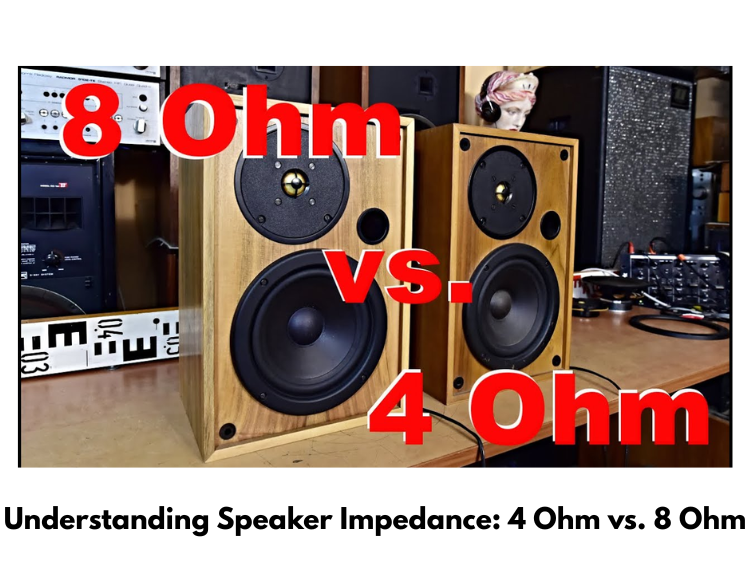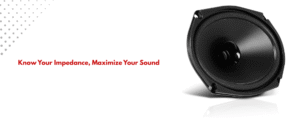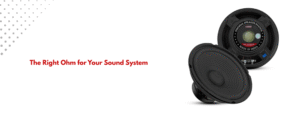Knowing about resistance is very important when picking out speakers for your music system. A question that comes up a lot is what the difference is between 4-ohm and 8-ohm speakers. Impedance changes how your speaker works with your amplifier, how good the sound is, and even how long your audio equipment lasts. Let us break down the basics so that you can make a smart choice.
What Is Speaker Impedance?
A speaker’s electrical resistance to the current flowing from the amplifier is called impedance, and it is expressed in ohms (Ω). Consider it the strain that the speaker puts on the amplifier. Speakers with lower impedance need more power, while speakers with higher impedance need less.
A lot of speakers, both home and business, are set at either 4 or 8 ohms. 4 and 8 ohms are the most popular.
Key Differences Between 4 Ohm and 8 Ohm Speakers
1. Current Demand
- 4 Ohm Speakers: The speakers need more power from the amplifier. The amp has to work harder to get the same power to the speaker contacts because they have less resistance.
- 8 Ohm Speakers: They make the amplifier work less hard. For the most part, this makes them easy to drive, especially with low- or mid-level amplifiers.
2. Volume and Power
- 4 Ohm Speakers: When compared to 8-ohm speakers, 4-ohm speakers can often put out more sound with the same amplifier because they draw more current. As long as your speaker can handle it, you might hear a small increase in volume.
- 8 Ohm Speakers: The 8-ohm speakers might not be as loud at the same power setting, but they are more stable and reliable, especially when listening for a long time.
3. Amplifier Compatibility
- 4 Ohm Speakers: If you have 4-ohm speakers, keep in mind that not all amplifiers can handle the low voltage of 4 ohms. When you use 4-ohm speakers with an amp that isn’t designed for them, the amp could get too hot, distort, or even break.
- 8 Ohm Speakers: With 8-ohm speakers, you can use a bigger range of amps. It is best for most home audio amplifiers to work with 8-ohm loads.
Before you connect 4-ohm speakers, you should always make sure that your amplifier can handle 4-ohm loads. Using the wrong mix can make things not work right.
Which Should You Choose?
Choose 4 Ohm Speakers If:
- You have a good speaker or car audio that can handle lower impedance.
- You want the loudest and most powerful sound possible, especially in small places or cars.
- You are adding 4-ohm speakers to a car stereo setup that already has them.
Choose 8 Ohm Speakers If:
- You are setting up a home audio system or a PA system where dependability and flexibility are more important than small volume boosts.
- You want to match amplifiers more easily without having to worry about them getting too hot.
- You’re connecting more than one speaker; 8-ohm setups let you wire them in more ways.
If you’re planning a new setup, you might want to explore the best raw replacement speakers in 2025 to find models that suit your impedance needs.
Important Tip: Matching Matters
Making sure that the amplifier and speakers have the same impedance makes the system work well. If the impedances aren’t right, the sound will be bad, the amplifier will work too hard, or the whole thing could break. Always check the amplifier’s instructions to see what range of sound resistance it supports.
For instance, if your amplifier can handle 8 ohms, adding a 4-ohm speaker without first trying to see if it can handle it could damage the amp. But many current amps are made to handle a wide range of loads automatically, so always check the numbers twice.
Conclusion
Figure out what works best for your system when deciding between 4-ohm and 8-ohm speakers. If you want your amp to make more noise, and it can, 4 ohms might be right for you. 8 ohms is a better bet if you want your system to be stable and work with more devices. Knowing about speaker resistance can help you keep your gear in good shape, get the most out of it, and enjoy better listening in general.




